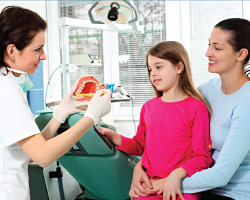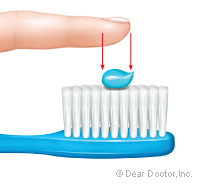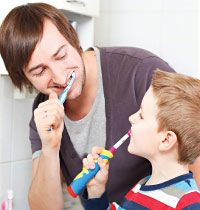How to Care for the Oral Health of Children with Disabilities and Special Needs
 |
| Inform your dentist of any special needs your child may have, because some extra personal attention or the modification of equipment or procedures in the office may be needed. |
Proper oral care is fundamentally important to the overall health of children with special needs. Children's special needs may make it difficult for them to perform daily oral care for themselves. Family members and/or caregivers may need to assist with these daily tasks.
Dental Visits
Inform your dentist of any special needs your child may have, because some extra personal attention or the modification of equipment or procedures in the office may be needed. Provide the dentist with the most complete picture of conditions and/or behavioral issues your child may have. Be sure that you discuss any concerns you may have before the first appointment and also prepare the information prior to your child's first dental visit including the following: diagnosis, current medications, contact information for other doctors, specialists, previous dentists, therapists, etc., insurance details, and any information that makes your child fearful or resistant.
Depending on the type of special needs, sometimes the dentist will need to consult with your child's primary care physician before starting dental treatment, especially if there are any underlying medical conditions. A consultation may be necessary if a child is taking medications or has a history of allergies to drugs or even latex (gloves). If the child sees many specialists, a list of doctors and/or therapists together with their contact information should also be included.
 |
| For children who do not gag or swallow toothpaste, use a pea-sized amount of a fluoride toothpaste or the amount equivalent to the size of the child's fingernail. |
 |
| Use a tell, show, do approach when introducing new items or steps. |
Setting the Stage for Daily Oral Healthcare at Home
- Choose a comfortable location — the bathroom is not the only place to brush teeth.
- Provide adequate light, fresh water for rinsing, and a mirror.
- Have a toothbrush, floss, gloves if used, toothpaste, and any rinses and/or swabs ready in advance.
- For children who might gag or swallow toothpaste, try using 1/2 a pea-sized amount — make sure it contains fluoride. Another option would be to try using a diluted fluoride mouthwash on a toothbrush.
Setting the Atmosphere
- Approach oral healthcare with a positive attitude and make it fun for your child.
- Use a tell, show, do approach when introducing new items or steps.
- Build trust and take it slow. Make the first several attempts positive to gain more cooperation later on.
- Use picture books, puppets or toys to demonstrate.
- Give lots of positive feedback to reinforce good behavior.
Setting Up a Routine
- Same place, same time, same steps. A consistent routine builds confidence and the child will look forward to daily oral care.
- Brush, rinse, floss and/or apply dental agents according to the dentist's instructions. Some children will need to have oral care several times each day.
- Keep a logbook of what works, what doesn't, and questions for your child's next dental visit.
Remember to maintain good nutrition and visit your dental professional regularly. Most importantly, model good healthcare behaviors for your child. This will encourage children to maintain their own proper oral healthcare, which may increase confidence in children with special needs.



